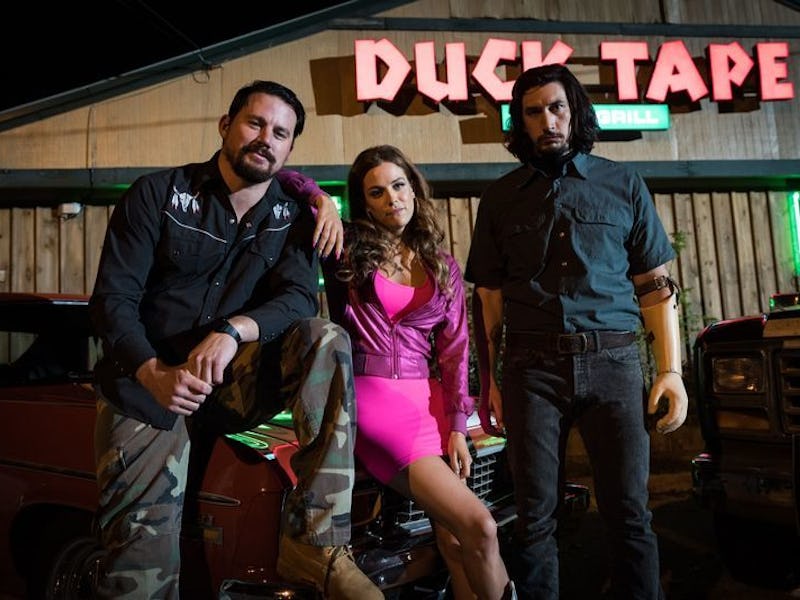'Logan Lucky' is 'Ocean's Eleven' for Trump's America
Steven Soderbergh and Channing Tatum tackle actual economic anxiety.

Steven Soderbergh’s movies are in some ways timeless, with even his earliest films as vibrant and watchable now as they were when they broke ground at Sundance. But they are also largely of their times: Sex, Lies, and Videotape existed in a world in which people still used videotapes, while Erin Brockovich came out amidst the renaissance of class action and personal injury lawsuits. Even 2012’s Magic Mike, a movie about male strippers, was really about post-financial crisis economic immobility.
This rule still applies to Soderbergh’s comeback feature, Logan Lucky. But it’s not just that the story of down-and-out West Virginians scheming to hit it rich is relevant today; it also offers a timely addendum (or even reply) to Soderbergh’s famous work, the Ocean’s trilogy.
Those heist thriller-comedies boasted the sort of superstar roster that red carpet show producers would still trade limbs to secure, led by George Clooney, Julia Roberts, Brad Pitt, and Matt Damon. During the trilogy’s run, from 2001-07, they were all at the height of their celebrity powers, and would have been the leading contenders for the era’s Mount Rushmore of Hollywood royalty. The movies were fun, no doubt, but they were also fantasies, with beautiful people in tuxedos and gowns making their way through impossibly glamorous locales; even the pickpockets and working grunts were attractive and dressed up in tuxes.
Inequality was spreading throughout the 2000s, but fatally cheap mortgages kept many people feeling financially secure throughout most of the decade. And following the “Greed is good ‘80s” and big economic gains in the ‘90s, aspiration was en vogue, which made the movies especially attractive. The final Ocean’s movie was released in 2007, a year before the bottom fell through the housing market, so there was no need to reckon with the societal disaster that was to come.
The housing collapse tanked the economy, which has recovered in fits and starts and in mutated ways, thanks to advances in both technology and corporate greed. Income inequality has soared to record levels, inspiring populist movements like Occupy Wall Street and, in their own twisted and misguided way, the Tea Party. Rural America in particular has been ravaged by the march of time, as well as the opioid crisis, which continues to churn out addicts and take lives with little federal intervention.
And it’s in that America that Logan Lucky works its hillbilly heist magic. It shares the bones of the Ocean’s series, but instead of black tie attire, it’s wearing cargo shorts and a camouflage hat. It’s got stars, but they look like they’ve followed the Wal-Mart frozen food aisle diet, not trained with personal chefs; their tans are from construction work and spray bottles, not Malibu hideaways. The characters in Ocean’s drive sleek sports cars and glide through five star Vegas casinos, while the Logan crew rumbles in pickup trucks and rests busted knees and war injuries in a trailer home.
Tatum’s Jimmy Logan is an embodiment of an America that has fallen short of its promise to most people: A former high school football star who blew out his knee in college and is now largely useless to the masters of the universe, but for his ability to take commands in the service economy. The movie begins with him losing his job driving a forklift at the massive Charlotte Motor Speedway, a venue that prints money, because his busted knee makes him an insurance liability, a modern indignity that immediately justifies his rogue decisions later on.
Jimmy is surrounded by other perfect archetypes: His brother Clyde (Adam Driver) is a veteran of the Iraq War who had his lower left arm blown off in combat, and now struggles to get by as a bartender at the local watering hole off the highway. Clyde goes on and on about the Logan clan’s legendary bad luck, and it’d be hard to argue that the universe is at least indifferent to the fate of his family, given the anecdotal evidence he provides.
Their sister, Millie (Riley Keough), does hair and helps provide a better female role model for Jimmy’s daughter, who is largely being raised by her mother (Katie Holmes), who is clearly sad to be living as a kept woman with a kind-but-doofy local car dealership magnate (David Denman). Then there is Joe Bang (Daniel Craig), an angry small-time bank vault cracker, and his two idiot brothers who we first meet at a very podunk local fair.
Adam Driver and Channing Tatum in 'Logan Lucky'
This is a portrait of the “economic anxiety” that well-heeled pundits blamed for Donald Trump’s surprise election victory last fall. The term itself has become toxic; it’s now mostly used as a derisive codeword thrown by liberals disgusted with the mainstream media’s long refusal to recognize the racism and hatred that fueled at least a large part of Trump’s victory. And while it’s very true that Trump has given voice and agency to a simmering evil in our society, it’s also true that economic inequality has exploded to Great Depression-levels of injustice.
Logan Lucky does not spend any time on race – all of its lead characters are white — but that doesn’t make its focus on rural poverty and immobility misguided or foolish. The movie is an updated version of the get-rich fantasy depicted in the Ocean’s movies. Instead of adding to piles of unspeakable wealth, these characters just want to pay rent and get even for once with the corporate masters that have helped shift the economy so significantly. And while you wanted to be Danny Ocean’s crew, you may feel more like you are a Logan, for better or worse.